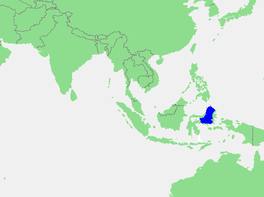|
Molucca Sea
The Molucca Sea (Indonesian: Laut Maluku) is located in the western Pacific Ocean, around the vicinity of Indonesia, specifically bordered by the Indonesian Islands of Celebes (Sulawesi) to the west, Halmahera to the east, and the Sula Islands to the south. The Molucca Sea has a total surface area of 77,000 square miles (200,000 square kilometres). The Molucca Sea is rich in coral and has many diving sites due to the deepness of its waters. The deepness of the water explains the reasoning behind dividing the sea into three zones, which functions to transport water from the Pacific Ocean to the shallower seas surrounding it. The deepest hollow in the Molucca Sea is the 15,780-foot (4,810-meter) Batjan (Indonesian: Bacan) basin. This region is known for its periodic experiences of earthquakes, which stems from the sea itself being a micro plate, in which the Molucca Sea is being subducted in two opposite directions: one in the direction of the Eurasian Plate to the west and the other in the direction of the Philippine Sea Plate to the east.  LocationThe Molucca Sea borders the Banda Sea to the south and the Celebes Sea to the west. To the north is Philippine Sea and to the east is Halmahera Sea. The islands bordering the Molucca Sea include Halmahera to the north east, Buru and Ceram in the centre, and Sulawesi to the west. The Talaud Islands to the north are considered to be the northern border the sea, though the Molucca Sea Plate, the tectonic plate named after the sea, extends further north. The International Hydrographic Organization (IHO) defines the "Molukka Sea" [sic] as being one of the waters of the East Indian Archipelago. The IHO defines its limits as follows:[1]
HistoryThe Portuguese, Dutch, British, and Spanish Empires fought each other for control of the spice islands that can only be accessed through the Molucca Sea. EarthquakesJanuary 6, 2019, measuring 7.0, with no tsunamis resulting. The sea is a very seismically active area due to the Molucca Sea Plate. See also
Notes
References |
||||||||||||||||||||||||||||

